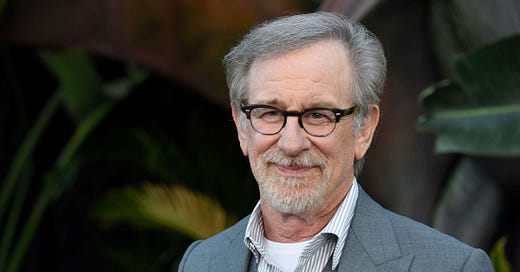As announced by The Hollywood Reporter, the production company Amblin Entertainment (founded by Steven Spielberg, Kathleen Kennedy and Frank Marshall in 1981) has signed a new deal with Netflix, committing to producing films for the streamer, with no limitations in terms of genre or budget. This does not supplant the company’s existing deal with Universal, under which part of the studio’s output (presumably everything Spielberg is directly involved with, for a start) will retain a theatrical release.
Inevitably, and especially among those who stop at the headline, the story has already made waves online, with quite a few people calling out Spielberg on his supposed hypocrisy: back in 2018, the filmmaker famously criticized Netflix for exploiting a loophole in Academy regulations in order to make “TV films” eligible for Oscars (what he repeatedly failed to mention is that he had a vested interest in Roma not winning Best Picture, since his company DreamWorks Pictures co-produced eventual winner Green Book).
Of course, Spielberg’s stance on TV films in general – although it is not unreasonable to assume how it came across was unintentional – seemed a bit baffling given his own experience in the field, to the extent that Duel – made for ABC – received a theatrical release outside of the US and is regarded as his feature debut in Europe.
Leaving all that aside, the new deal should not come as a surprise, despite Spielberg’s stated preference for the theatrical experience (which is why it’s important to point out, once again, the new situation does not affect the previous deal with Universal and will presumably be tied to titles that would struggle in today’s theatrical marketplace). While it is entirely possible, he simply changed his mind about films made for streamers in general, the more likely explanation is, being the savvy businessman he is, he came to an inevitable conclusion.
Lest we forget, Spielberg and his friend George Lucas addressed the state of the American film industry in 2013, and in that context the director of E.T. and Jaws pointed out that even his name doesn’t carry that much weight anymore: Lincoln, which ended up costing 65 million dollars and grossing 275 million in cinemas, came dangerously close to becoming an HBO movie, a fate that actually befell Steven Soderbergh’s Behind the Candelabra, rejected by all the major studios because they thought it was “too gay” (Soderbergh briefly retired from making movies as a result).
And even before that, when making The Adventures of Tintin for Sony and Paramount, Spielberg and his producing partner Peter Jackson had to waive their customary percentage of the box office takings in order to get the movie financed, due to the source material’s overall obscure status in the United States.
Under those circumstances, it stands to reason that a filmmaker who is intimately familiar with the business side of the industry would look favorably upon a partnership that allows him to freely produce the kind of stuff the big studios are unlikely to touch with a ten-foot pole, while continuing to work with said studios on more audience-friendly titles (Spielberg’s next film, West Side Story, will come out in theaters courtesy of Disney’s 20th Century Studios division).
And even without Netflix’s well-documented penchant for granting filmmakers complete freedom, it’s unlikely Spielberg would not be allowed to weigh in on matters: most recently, when he pitched the Animaniacs reboot to streamers, one non-negotiable item was the return of the original cast. One imagines he will be able to secure at least a limited release for the Netflix-backed Amblin movies in theaters, like the deal Martin Scorsese got for The Irishman (Scorsese openly praised the fact he got a guaranteed four-week run in New York, which was more than some of his previous films received under a more traditional business model).
Is this the end of the filmmaking world as we know it? Probably not. It’s just a smart filmmaker and businessman realizing alternative systems are a thing, and – presumably – using them to his best advantage. Streaming is here to stay, but cinemas are not going anywhere, despite what some might tell you. And Spielberg will be at the forefront to make sure the theatrical experience doesn’t go the way of the dinosaur.




